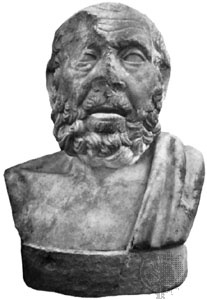aphorism
statement
a concise expression of doctrine or principle or any generally accepted truth conveyed in a pithy, memorable statement. Aphorisms have been especially used in dealing with subjects that were late in developing their own principles or methodology—for example, art, agriculture, medicine, jurisprudence, and politics.
 The term was first used in the Aphorisms of Hippocrates, a long series of propositions concerning the symptoms and diagnosis of disease and the art of healing and medicine. The first aphorism, which serves as a kind of introduction to the book, runs as follows:Life is short, Art long, Occasion sudden and dangerous, Experience deceitful, and Judgment difficult. Neither is it sufficient that the physician be ready to act what is necessary to be done by him, but the sick, and the attendants and all outward necessaries must be lightly prepared and fitted for the business.
The term was first used in the Aphorisms of Hippocrates, a long series of propositions concerning the symptoms and diagnosis of disease and the art of healing and medicine. The first aphorism, which serves as a kind of introduction to the book, runs as follows:Life is short, Art long, Occasion sudden and dangerous, Experience deceitful, and Judgment difficult. Neither is it sufficient that the physician be ready to act what is necessary to be done by him, but the sick, and the attendants and all outward necessaries must be lightly prepared and fitted for the business.A well-known medieval collection of aphorisms is that formulated in about 1066 in Latin verse by the celebrated doctor Joannes de Meditano, giving the precepts of the medical school of Salerno. Another collection of aphorisms, also medical and also in Latin, is that of the Dutchman Hermann Boerhaave (Boerhaave, Hermann), published at Leiden in the year 1709; it gives a terse summary of the medical knowledge prevailing at the time and is of great interest to the student of the history of medicine.
The term was gradually applied to the principles of other fields and finally to any statement generally accepted as true, so that it is now roughly synonymous with maxim.
- K'ou Ch'ien-chih
- Koudougou
- Koufax, Sandy
- Kouilou River
- Koulikoro
- Koumoundhoúros, Aléxandros
- Ko Un
- Koundara
- kouprey
- kouros
- Kourou
- Kourouma, Ahmadou
- Kouroussa
- Koussevitzky, Serge
- Koussi, Mount
- Kovalevskaya, Sofya Vasilyevna
- Kovalevsky, Aleksandr Onufriyevich
- Kovrov
- kovsh
- Kowloon Peninsula
- kowtow
- Koyukuk River
- Kozhikode
- Kozyrev, Nikolay Aleksandrovich
- Kozáni